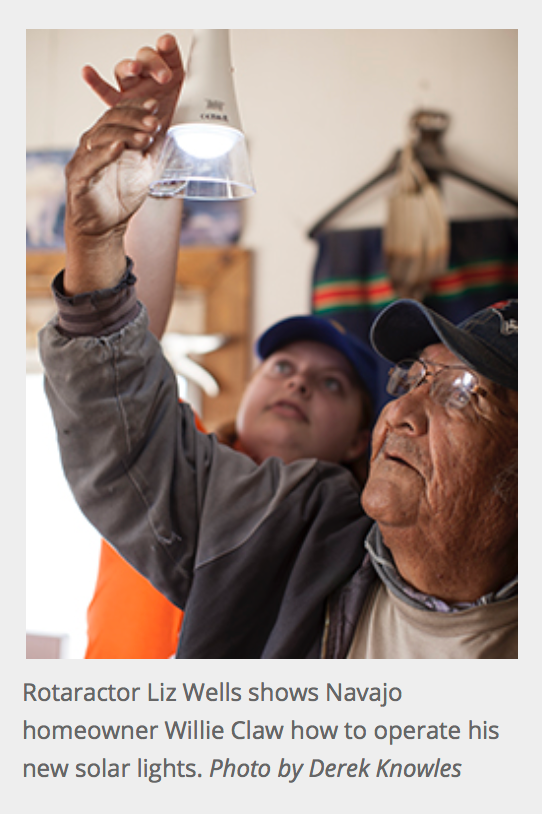
By Joe Williams, Rotary Club of Durango Daybreak, Colorado, USA
Most people in the United States take electricity for granted. Only if a powerful storm hits and it is taken away do we get an understanding of what it is like to depend entirely on the sun for our light.
There is, however, a significant population in the heart of the United States that lives their lives with only the sun to light the way.
The Navajo Nation is large. Our club is located slightly north of the Nation. And so our project began.
It seems a simple thing. The whole setup consists of just one, two, or three hanging lights and a cell phone charger, with a small solar panel to power it. The impact this has on the people living in the home, however, is huge. Our recipients report better health, improved grades, improved finances and generally happier lives.
Elderly recipients report that they fall less when there is light to see where they are going at night. Before receiving the lights, many recipients relied on kerosene lanterns or candles, significantly reducing air quality in the home.
Due to the remote nature of many homes, children often travel by school bus for multiple hours every day. Before having light in their home, all homework had to be completed on the bus, or by candlelight or kerosene lantern.
One mother in Sanostee explained that she normally sent her daughter to her grandparents to complete her homework since they had power. She is happy that she will see her daughter more and be able to supervise the homework.
Powering evening activities with flashlight batteries or kerosene costs families on fixed income. The free solar power allows the families to spend less on fuel and batteries.
It is not unusual for recipients to stand by with tears in their eyes watching the crews install the new lights.
One woman surprised one of our crew at an event. She explained that her uncle had received a light kit a few months ago. She said that he did not initially think he wanted or needed the lights, but he loved having them. She felt that he had become a happier person in general after living with the lights for a few short months.
An important part of the installations has been to involve our local Interact clubs and Rotary Youth Exchange students. We included students from Hungary, Brazil, Taiwan, Denmark and Germany during a recent installation.
Both the elders and children discover the common bonds that tie all of us together in that moment when they turn on the light, faces shining in the glow, smiles erupting, old tired eyes looking into the bright eyes of the youth. These children perhaps for the first time see the profound difference Rotary can make in lives.